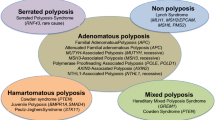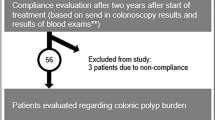Abstract
The long-term (mean of 16.4±4.2 months) efficacy and safety of rofecoxib (a specific COX-2 inhibitor) in maintaining the colon free of polyps in familial polyposis patients was assessed. Eight patients were treated with rofecoxib 25 mg every day. Sigmoidoscopy/colonoscopy was performed at study entry and every six months. At each endoscopy the number, size, and histological grade of all polyps were assessed, and the polyps were removed. The drug was well tolerated with no significant adverse events throughout the study. A highly significant reduction in the rate of polyp formation (70–100%) was observed in all patients from a mean number of 15.1±11.7 at baseline to 6.0±5.8 at one year and 1.6±1.6 at the end of follow-up (P =0.016 and 0.008, respectively). No patient developed cancer or high-grade adenoma. In conclusion, Long-term use of rofecoxib is well tolerated and effective in inhibiting polyp formation in polyposis patients.
Similar content being viewed by others
References
Villavicencio RT, Rex DK: Colonic adenomas: prevalence and incidence rates, growth rates, and miss rates at colonoscopy. Semin Gastrointest Dis 11:185-193, 2000
Williams CS, Smalley W, DuBois RN: Aspirin use and potential mechanisms for colorectal cancer prevention. J Clin Invest 100:1325-1329, 1997
Ahnen DJ: Colon cancer prevention by NSAIDs: What is the mechanism of action? Eur J Surg; Suppl 582:111-114, 1998
Arber N: NSAIDs prevent colorectal cancer. Can J Gastroenterol 14:299-307, 2000
Wolfe MM, Lichtenstein DR, Singh G: Gastrointestinal toxicity of nonsteroidal anti-inflammatory drugs. N Engl J Med; 340:1888-1899, 1999
Kinzler KW, Nilbert MC, Su LK, Vogelstein B, Bryan TM, Levy DB, Smith KJ, Preisinger AC, Hedge P, McKechnie D: Identification of FAP locus genes from chromosome 5q21. Science 253:661-665, 1991
Heiskanen I, Jarvinen HJ: Fate of the rectal stump after colectomy and ileorectal anastomosis for familial adenomatous polyposis. Int J Colorectal Dis 12:9-13, 1997
Bullow C, Vasen H, Jarvinen H, Bjork J, Bisgaard ML, Bulow S: Ileorectal anastomosis is appropriate for a subset of patients with familial adenomatous polyposis. Gastroenterology 119:1454-1460, 2000
Waddell WR, Ganser GF, Cerise EJ, Loughry RW: Sulindac for polyposis of colon. Am J Surg 157:175-179, 1989
Cruz-Correa M, Hylind LM, Romans KE, Booker SV, Giardiello FM: Long-term sulindac therapy is effective in familial adenomatous polyposis. Gastroenterology 122:641-645, 2002
Giardiello FM, Hamilton SR, Krush AJ, Piantadosi S, Hylind LM, Celano P, Booker SV, Robinson CR, Offerhaus GJ: Treatment of colonic and rectal adenomas with Sulindac in familial adenomatous polyposis. N Engl J Med 328:1313-1316, 1993
Labayle D, Fisher D, Vielh P, Drouhin F, Pariente A, Bories C, Duhamel O, Trousset M, Attali P: Sulindac causes regression of rectal polyps in familial adenomatous polyposis. Gastroenterology 101:635-639, 1991.
Giardiello FM, Yang VW, Hylind LM, Krush AJ, Petersen GM, Trimbath JD, Piantadosi S, Garrett E, Geiman DE, Hubbard W, Offerhaus GJ, Hamilton SR: Primary chemoprevention of familial adenomatous polyposis with Sulindac. N Engl J Med 346:1054-1059, 2002
Hla T, Neilson K: Human cyclooxygenase-2 cDNA. Proc Natl Acad Sci USA 89:7384-7388, 1992
Eberhart CE, Coffey RJ, Radhika A, Giardiello FM, Ferrenbach S, DuBois RNl: Up-regulation of cyclooxygenase 2 gene expression in human colorectal adenomas and adenocarcinomas. Gastroenterology 107:1183-1188, 1994
Marx J: Anti-inflammatory inhibits cancer growth—but now? Science 291:581-582, 2001
Reddy BS, Rao CV, Seibert K: Evaluation of cyclooxygenase-2 inhibitor for potential chemopreventive properties in colon carcinogenesis. Cancer Res 56:4566-4571, 1996
Oshima M, Dinchuk JE, Kargman SL, Oshima H, Hancock B, Kwong E, Trzaskos JM, Evans JF, Taketo MM: Suppression of intestinal polyposis in APC delta716 knockout mice by inhibition of cyclooxygenase 2 (COX-2). Cell 87:803-809, 1996
Steinbach G, Lynch PM, Phillips RK, Wallace MH, Hawk E, Gordon GB, Wakabayashi N, Saunders B, Shen Y, Fujimura T, Su LK, Levin B: The effect of celecoxib, a cyclooxygenase-2 inhibitor, in familial adenomatous polyposis. N Engl J Med 342:1946-1952, 2000
Jacoby RF, Seibert K, Cole CE, Kelloff G, Lubet RA: The cyclooxygenase-2 inhibitor celecoxib is a potent preventive and therapeutic agent in the min mouse model of adenomatous polyposis. Cancer Res 60:5040-5044, 2000
Oshima M, Murai N, Kargman S, Arguello M, Luk P, Kwong E, Taketo MM, Evans JF: Chemoprevention of intestinal polyposis in the Apcdelta716 mouse by rofecoxib, a specific cyclooxygenase-2 inhibitor. Cancer Res 61:1733-1740, 2001
Cancer Therapy Evaluation Program: Common toxicity criteria. Bethesda, Maryland, National Cancer Institute, March 1998
Altman DG: Practical Statistics for Medical Research. London, Chapman & Hall, 1990
Winde G, Schmid KW, Schlegel W, Fischer R, Osswald H, Bunte H: Complete reversion and prevention of rectal adenomas in colectomized patients with familial adenomatous polyposis by rectal low-dose sulindac maintenance treatment. Dis Colon Rectum 38:813-830, 1995
Tonelli F, Valanzano R, Messerini L, Ficari F: Long-term treatment with sulindac in familial adenomatous polyposis: is there an actual efficacy in prevention of rectal cancer? J Surg Oncol 74:15-20, 2000
Nugent KP, Farmer KC, Spigelman AD, Williams CB, Phillips RK: Randomized controlled trial of the effect of sulindac on duodenal and rectal polyposis and cell proliferation in patients with familial adenomatous polyposis. Br J Surg 80:1618-1619, 1993
Niv Y, Fraser GM: Adenocarcinoma in the rectal segment in familial polyposis coli is not prevented by sulindac therapy. Gastroenterology 107:854-857, 1994
Kaur BS, Khamnehei N, Iravani M, Namburu SS, Lin O, Triadafilopoulos G: Rofecoxib inhibits cyclooxygenase 2 expression and activity and reduces cell proliferation in Barrett's esophagus. Gastroenterology 123:60-67, 2002
Jeevaratnam P, Cottier DS, Browett PJ, Van De Water NS, Pokos V, Jass JR: Familial giant hyperplastic polyposis predisposing to colorectal cancer: A new hereditary bowel cancer syndrome. J Pathol 179:20-25, 1996
Author information
Authors and Affiliations
Corresponding author
Rights and permissions
About this article
Cite this article
Hallak, A., Alon-Baron, L., Shamir, R. et al. Rofecoxib Reduces Polyp Recurrence in Familial Polyposis. Dig Dis Sci 48, 1998–2002 (2003). https://doi.org/10.1023/A:1026130623186
Issue Date:
DOI: https://doi.org/10.1023/A:1026130623186




